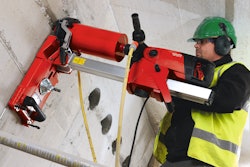As the construction industry's labor shortage continues to intensify, the need for workforce development professionals and mentors is at an all-time high. In response to the growing demand for these individuals, NCCER released two new training programs: Construction Workforce Development Professional and Mentoring for Craft Professionals. Both titles were developed by teams of subject matter experts.
The Construction Workforce Development Professional program is the first of its kind in the construction industry and establishes a standard for the skills and knowledge a construction workforce development professional should possess. True workforce development encompasses forecasting industry needs and recruiting, training, assessing and retaining skilled professionals. With this broad scope of responsibilities, it can be difficult for an organization to find an experienced professional to oversee all of these factors.
Topics in the curriculum include effective communication; managing craft training programs and registered apprenticeships; policies and ethics; workforce and instructor recruitment; financial management and budgeting; marketing, public relations and community outreach; and business plan development. Training module completions from the curriculum are recorded in NCCER's Registry System when the program is taught under an NCCER certified instructor at an accredited organization.
The Construction Workforce Development Professional program also includes a certification that is awarded to individuals who meet the requirements and successfully complete the written assessment through an NCCER Accredited Assessment Center. To find an NCCER accredited training and/or assessment center, visit nccer.org/center-search.aspx.
Along with the Construction Workforce Development Professional program, NCCER also released its Mentoring for Craft Professionals curriculum. With the average age of today's craft professional between 48-52 years old and 75 million baby boomers approaching or already at retirement age, it is becoming more important than ever for experienced craft professionals to pass along their knowledge to younger craft professionals. Experienced craft professionals have a lot to offer the younger generation. As mentors, they can leave a legacy and give back to the industry that has given them so much.
The Mentoring for Craft Professionals curriculum details the expectations and outcomes of a mentoring relationship, characteristics of effective mentors, phases of mentoring relationships, communication techniques, conflict resolution and elements of a formal mentoring program. After completing the training program, mentors will be able to determine the needs of trainees and how they learn best. Through mentorship, the future construction workforce will be equipped with the skills and expertise needed to maintain the industry's success.
"The responsibility for attracting and developing a new generation of craft professionals cannot rest only on the shoulders of a few," said Sabra Phillips, director of talent development at Marek and a subject matter expert on the development team for the mentoring program. "To make a big enough impact, we need all craft professionals equipped and empowered to take on the challenge of growing others. By developing a curriculum specifically around mentoring, NCCER shines a spotlight on this need and provides an avenue for industry to develop this skill set in all of our craft leaders."
NCCER Offers New Construction Workforce Development Professional, Mentoring for Craft Professionals Training Programs
New training programs designed to address construction industry's labor shortage and develop mentors in the industry
Sep 20, 2016
Latest in Training & Education
Why Serious Injury and Fatality Prevention Needs a New Strategy
December 18, 2025



















